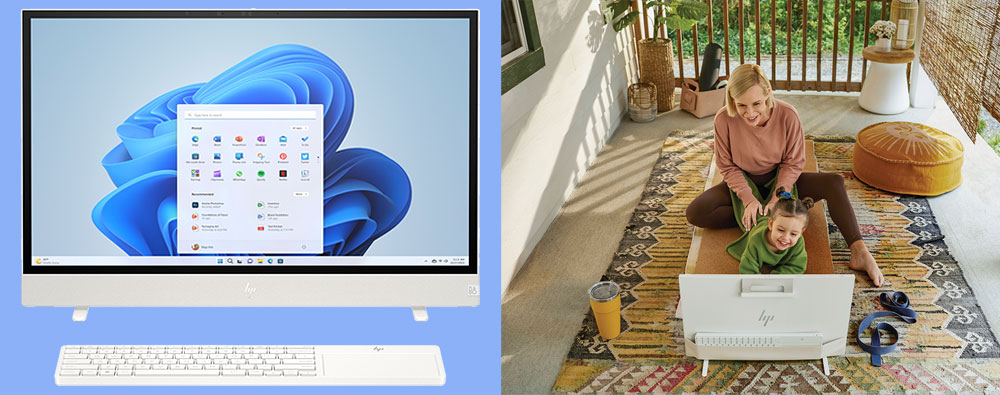HP Imagine is a new conference focusing on the company’s innovation. Last week, there was an impressive amount of innovation showcased in stellar fashion by HP Chief Digital & Transformation Officer Stella Low and her team. It stands as one of the best-executed presentations I’ve ever attended.
Innovation is a difficult topic because it’s often overhyped. Buyers don’t really want innovation because it represents risk, but where they need innovation is for problems that haven’t been solved adequately or at all.
The use of the word “imagine” rather than “innovation” for HP’s event positioned the effort well because it was a showcase of innovative technologies that captured the imagination. By doing so, it highlighted the difference between properly applied innovation and pointless innovation.
What HP presented should leapfrog the company ahead of its competitors over the next several years as we deal with the fallout of the hybrid workplace and the difficulties in managing and equipping a dispersed workforce.
I continue to be impressed by HP CEO Enrique Lores and his executive team. They consistently demonstrate unity and a shared commitment to solving some of the most annoying problems customers of all sizes face.
One of the most interesting imaginative innovations, Workforce Central, was presented by HP VP of Product Management Mike Nash. HP developed Workforce Central to enhance effectiveness with remote workers and is now expanding it to its customers and partners.
Let’s talk about HP Imagine 2023 this week. Then we’ll close with my new favorite product for folks working from home, the HP Envy Move, which could be perfect for someone working from home who also needs to manage their kids, pets, aging relatives, or just wants to be both mobile and productive in the home.
How To Present Innovation
Much of the problem in presenting a new product set is establishing context. Most vendors spend their time pitching components of a solution but spend almost no time demonstrating the issues that need to be solved so they can position their offerings as a solution that solves customers’ problems.
You want AI? Buy our servers, PCs, controllers, and workstations, and somehow, magically, the result will be an AI, even though we know that creating a working large language model can cost many multiples of what the hardware costs to buy. Ideally, a vendor should present their components as part of a solution, emphasizing how it can make their company more efficient and effective.
HP essentially took this approach. It identified the problem by referencing surveys indicating that over 27% of employees are profoundly dissatisfied with hybrid work and perceive it as detrimental. This dissatisfaction has evident repercussions on employee retention, productivity, and work-life balance.
The presentation also highlighted that AI, as currently practiced in the cloud, was 80% more expensive than it needed to be. So, HP’s solutions tackle both issues by enhancing financial efficiency and boosting employee productivity, all while maintaining work-life balance and job satisfaction.
Alex Cho: Live, Work, and Dream
Alex Cho, who leads HP’s PC unit, positioned HP at the forefront of the AI age. He discussed how much more cost-effective it is to create and use AI solutions at the edge, which is instrumental in achieving the 80% cost reduction mentioned earlier.
HP’s AI workflow offering was a nearly ideal solution for those trying to integrate computer scientists into an AI creation workflow process that included the internal customers for the resulting offering. While many view Nvidia as a component supplier, HP highlighted Nvidia as a creation partner. In the realm of AI knowledge, Nvidia is second only to IBM. Though, even IBM acknowledges Nvidia’s advantages and works with Nvidia.
Nvidia’s true advantage in AI lies not in its products but in its decades of experience creating working AI models. Considering the significant costs associated with AI creation rather than the hardware, this expertise is a crucial edge that HP is tapping into.
While that was impressive, HP also showcased how it’s making it so HP peripherals connect automatically to HP PCs, a direction that resonates well with HP customers and mirrors an Apple-like approach.
This presentation highlighted another concept that had me tear up a bit, which is that under these new remote rules, people — particularly those who are introverted and new to corporate life — are having trouble connecting to peers and managers.
HP clearly has a goal to ensure that those whose voices are being lost receive their rightful place within their companies. We were presented with the concept that “A thought is never lost when a voice is found.”
So many people who should have a voice don’t, and helping to fix that problem hit me where I live as I, too, am concerned that we are leaving too many (one would be too many) isolated with work-from-home policies and related poor engagement practices.
Dave Shull: It’s About the Team, Not the Machine
Dave Shull joined HP as a result of the Poly acquisition, and I got a chance to chat with him about his views on managing a remote workforce. His methods with his own hybrid team are a list of best practices where he incorporated mandatory social engagements. When he ran into people struggling with remote work, he’d have them engage in person more often to overcome their feelings of isolation.
Shull spoke of the need for a vision and how tools like HP’s Collaboration Services could be used to better ensure all members of a hybrid working team could feel engaged, included, and become more productive while better assuring adequate work-life balance.
He also outlined how conference rooms needed to become more of a subscription business so that users didn’t constantly run into the problem of someone mucking with the setup and making the room unusable because of disconnected cables or damaged equipment.
Shull further addressed the use of metrics to optimize the workforce by tracking employee sentiment and assuring the best work experience.
On sustainability, he talked about a concept I first saw from Dell called Concept Luna and how to make it work in the real world. It’s called Renew Solutions, a process that will drive HP to develop ever more upgradeable and sustainable PCs. He emphasized that users not seeking the latest technology could view future HP refurbished PCs as equivalent to new ones, marking a significant stride in promoting reuse and recycling.
Shull also discussed using data on employees’ work to provision them more effectively. Applying this data to their website could offer much clearer guidance to consumers and small businesses regarding PC selection.
Finally, he emphasized HP Wolf Security and gave a personal example of its benefits. Shull had left his laptop at the airport and was able to track it, power it on remotely, and wipe the data. HP Wolf Security is unique to the segment and highlights HP’s goal to lead that segment as the most secure PC vendor.
Tuan Tran: Printer Innovation Is ‘On Fire’
Being “on fire,” in this case, is a good thing. Printing is a declining business, and Tran is working to turn it back into a growth business by providing new printers that are more energy-efficient and faster across all segments.
HP has achieved breakthroughs in various printing technologies, including large format printers, industrial graphics printers, 3D printers (metal and plastic), and latex printers. These latex printers can potentially revolutionize the wrap business, expanding its applications from cars and commercial vehicles to wall coverings and other decorations.
One of the most intriguing announcements at this event featured the Robotic Site Printer. This device converts a blueprint into a physical layout on a slab or floor, assisting construction workers in accurately placing building components before construction begins.
When connected to a metaverse digital twin building effort, this little robot could be a game changer for construction by significantly reducing build errors. One of my first jobs was in commercial development, and this would have solved a significant problem with my first large project.
Printing arguably leads the industry in sustainability efforts and needs to, given the nature of printing and its related consumables. HP remains a pioneer here. What stood out at this event was its collaboration with 3D printing, highlighting a line of Brooks shoes equipped with efficiently designed 3D-printed soles.
As an interesting side note, about 20 years ago, I followed a group that spun out of Microsoft and created a computer-designed shoe company. I custom-designed a pair of shoes I still have, but the company failed because there were no 3D printers then, and the cost of the shoes exceeded the price they wanted to pay.
HP has clearly solved that cost vs. price problem with this 3D print technology.
Wrapping Up
At the end of the HP Imagine 2023 event, I met with Mike Nash, who took me through HP’s Workforce Central platform, which has to be the most effective workforce management tool I’ve ever seen.
I earned my second degree in Manpower Management. Back when I was in school, we dreamed and tried to create a tool that would more effectively equip employees and manage their resources to optimize productivity and boost employee satisfaction.
The technology of the time wasn’t up to the task, but Nash demonstrated that this can now be done with proper data capture and an increasingly effective use of AI. While the effort is relatively new, it is already positively impacting HP’s employees, and customers are chomping at the bit to get access to this platform.
In the end, the way HP continues to stand out is that it cares most about assuring the strength of its people and customers than anything else, which shows in how HP approaches problems and builds solutions. It isn’t just pitching products. It’s casting a stronger, more productive, effective, engaged, healthier, and happier workforce for HP, its partners, and its customers.
I just wish more companies had this focus. If they did, we’d live in a better world.
HP Envy Move All-in-One PC
When we work from home, we need to be mobile because we need to multi-task and watch the kids or the pets or just reposition as the seasons change to get the best indoor or outdoor experience. A laptop is fine, but the tradeoff of the screen size is problematic. What is needed is something portable enough to move from room to room but doesn’t need to go on an airplane.
The HP Envy Move is a 23.8-inch portable all-in-one PC with 4-hour battery life for those times you might want to work on the road or in an RV. It is interesting to note that the customers who HP used to define the product also wanted it to work in the bathroom so they could stream shows while taking a bath.

HP Envy Move 23.8-inch All-in-One PC (Images Credit: HP)
As a result, the Envy Move is kind of a combination of a 23.8-inch streaming TV and a portable PC. It has a built-in handle with a 9 lb. carry weight, a keyboard that fits in a pocket on the back, and a stand that automatically deploys when you set it down. At just under $900, it won’t break the bank. I only wish it came in black.
The HP Envy Move comes the closest to what I think should be the best PC for folks working from home who want a bigger screen but don’t really need a laptop, so it is my Product of the Week.
Read the full article here

